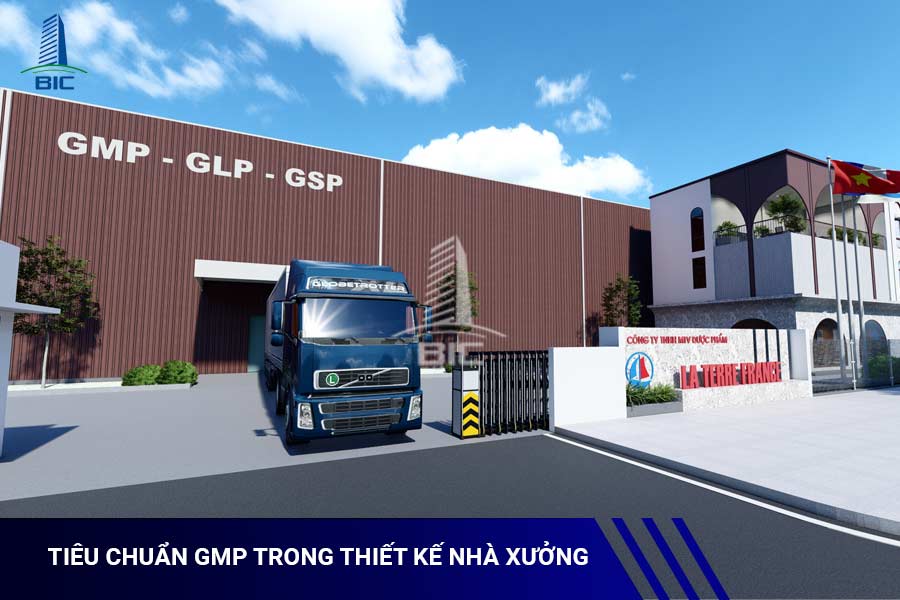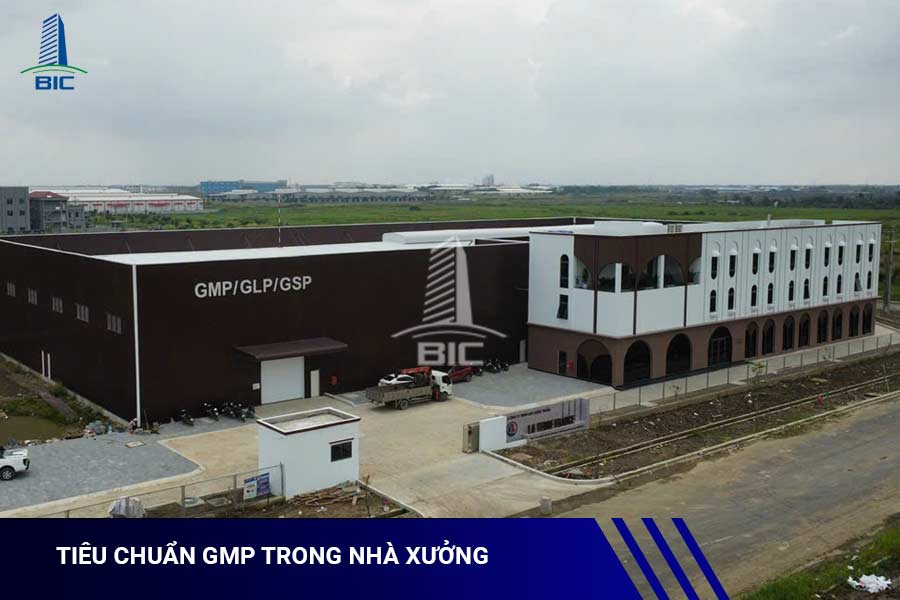
In the field of industrial production especially pharmaceuticals, food, cosmetics, and medical devices compliance with GMP (Good Manufacturing Practice) has become a mandatory requirement to ensure product quality and consumer safety. GMP is not only a system of technical regulations in production management but also directly influences factory design right from the initial stage. A GMP-compliant facility must meet a series of stringent requirements, from layout planning and material structure to ventilation, water supply and drainage, and waste treatment systems.
In practice, many companies face difficulties in accessing international markets simply because their factories do not meet GMP standards. Investing in design and construction according to these standards not only ensures consistent product quality but also enhances reputation, creates competitive advantages, and expands export opportunities. Therefore, GMP is not merely a regulation but also a key to sustainable development and global integration.
With extensive experience in designing and constructing GMP-compliant factories across multiple industries, BIC accompanies businesses in meeting the rigorous requirements of GMP. From surveying and master planning to implementation, BIC focuses on synchronization, international standard compliance, and long-term operational efficiency, delivering facilities that are both safe and cost-effective.
GMP (Good Manufacturing Practice) is an international standard system designed to ensure that products are consistently produced and controlled in terms of quality, safety, and regulatory compliance. This standard is particularly critical for industries directly related to human health, such as pharmaceuticals, food, cosmetics, and medical devices.
The core of GMP is strict control over all factors affecting the production process, with factory design playing a foundational role. A GMP-compliant factory must be scientifically planned, with clear separation of production, storage, and auxiliary areas to minimize cross-contamination risks. Additionally, construction materials must meet safety requirements easy to clean, resistant to mold, dampness, and dust.
Beyond infrastructure, GMP also requires environmental control through ventilation, air treatment, lighting, and water supply and drainage systems. All these elements must be integrated from the design stage to ensure stable operations and compliance with domestic and international regulatory inspections.
Applying GMP brings significant benefits to businesses. It not only ensures high-quality, consistent products but also strengthens brand credibility and opens access to demanding markets such as the U.S., EU, and Japan. Therefore, GMP is not just a mandatory standard but also a long-term strategy for sustainable business growth.
.jpg)
GMP standards require factories to be located in areas convenient for production and transportation, while minimizing exposure to external pollution sources such as dust, chemicals, or densely populated residential zones. In master planning, production areas, raw material warehouses, finished product storage, offices, and auxiliary facilities must be logically separated, with distinct routes to avoid cross-contamination risks.
The layout of a GMP factory follows a one-way principle: raw materials enter from one end, undergo production processes, and exit as finished products from the other. Personnel and material flows must be separated to minimize contamination risks. Areas with different cleanliness levels must be clearly demarcated with strict access control.
Floors, walls, and ceilings in GMP factories must be flat, smooth, crack-free, and easy to clean. Construction materials must be moisture-proof, mold-resistant, and dust-free. Ceilings should be designed to minimize condensation and dust falling into production areas. These principles are mandatory to ensure a clean and safe production environment.
GMP requires factories to have air treatment systems that maintain positive pressure, preventing dust and microorganisms from entering. Air filtration systems (HEPA, HVAC) are applied in high-cleanliness areas. Lighting must be adequately and evenly distributed across production zones to ensure both safe working conditions and effective product quality control.
A GMP facility must have a clean water supply meeting standards and a properly designed drainage system to avoid stagnation or contamination. Both industrial and domestic wastewater must be treated to required standards before discharge. Solid waste, particularly hazardous waste, must be stored in designated areas and handled according to regulations.
In addition to production requirements, GMP emphasizes human and asset safety. Factories must be equipped with standard fire protection systems, clear and accessible emergency exits, and safety equipment such as fire alarms, extinguishers, and emergency lighting, all systematically arranged and regularly inspected.

Compliance with GMP from the design stage keeps the production environment clean, minimizing contamination and cross-contamination risks. As a result, products achieve consistent quality and meet both domestic and international regulatory requirements.
A GMP-compliant facility acts as a “passport” for products to enter demanding markets like the EU, U.S., and Japan. Consumers and partners value GMP compliance as proof of professionalism and quality commitment. Owning a GMP facility boosts brand credibility and creates opportunities for international cooperation.
A properly designed GMP factory significantly lowers risks during operations from product contamination to workplace accidents. By minimizing risks, businesses avoid costly recalls, legal penalties, or costly facility renovations. This is a critical financial benefit, especially for industries requiring stringent quality standards.
GMP-compliant design ensures scientific space allocation and clear zoning, optimizing production flow. With efficient movement of raw materials and products, businesses can reduce production time, minimize waste, and improve labor productivity. It also facilitates transparent and effective quality and safety management.

Building a GMP-compliant facility requires significant upfront investment in design, materials, technical systems, and equipment. Costs are often much higher than conventional factories, as all components must meet strict standards. Advanced systems such as cleanroom air treatment, wastewater management, ventilation, and cross-contamination prevention drive initial costs up considerably.
A GMP facility is not only about design compliance but also about strict operational procedures. Personnel must follow hygiene regulations, use protective equipment, and perform tasks according to protocols. Companies must establish comprehensive quality management systems, including raw material control, production monitoring, and final product inspection. This poses challenges for businesses without prior experience in international standards.
Not all engineers or workers are familiar with GMP principles. Businesses must train staff at all levels from management and technical teams to production workers to ensure understanding and compliance. This requires time, investment, and long-term commitment since even minor errors can cause non-compliance.
Achieving GMP certification is challenging, but maintaining it long-term is even harder. Businesses must perform regular maintenance, inspections, and continuous improvements to meet evolving market requirements. Neglecting maintenance or operational discipline may result in losing certification, severely impacting credibility and operations.

Applying GMP in factory design requires deep technical expertise, knowledge of international standards, and understanding of specific industry requirements. It is not merely constructing an industrial building but integrating structures, materials, technical systems, and operational processes in harmony.
A professional design and construction unit can help businesses:
- Provide tailored design solutions aligned with production scale and product type.
- Ensure full compliance with GMP requirements, from layout and materials to HVAC, fire protection, and waste management systems.
- Manage costs and timelines effectively, avoiding unexpected overruns.
- Support businesses in regulatory inspections and GMP certification processes, saving time and reducing legal risks.
The role of such design firms extends beyond construction, as they continue to support businesses throughout the facility’s lifecycle, ensuring long-term GMP compliance.
GMP standards in factory design are not only mandatory for many industries but also a decisive factor in business competitiveness on the global market. From environmental control and scientific layout planning to materials selection and technical systems, every detail must be meticulously planned to ensure consistently high product quality.
Investing in a GMP-compliant factory brings both immediate benefits such as quality assurance and reputation and long-term advantages, including export opportunities and sustainable development. With expertise in designing and building industrial facilities, BIC partners with businesses to deliver GMP-standard projects, offering optimized solutions from design and construction to operation. This serves as a solid foundation for enterprises to establish credibility and build lasting trust with partners and customers.